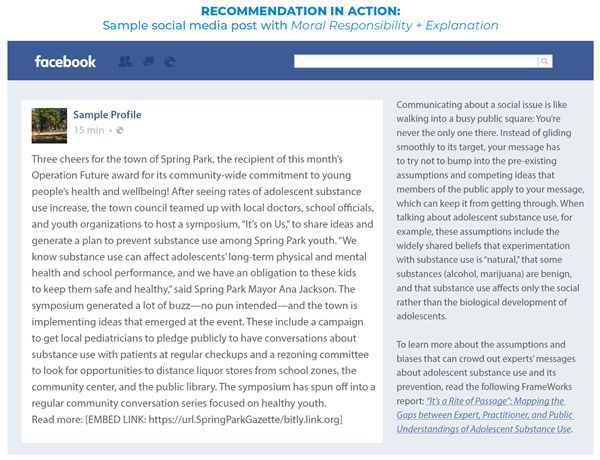While many voices are engaged in public discussions about substance use, too little focus is placed on public health approaches that can keep young people from developing substance use problems in the first place. This National Prevention Week, supported by the Substance Abuse and Mental Health Services Administration, we celebrate the importance of prevention in young people’s lives. Because people don’t understand the ways in which substance use impacts healthy development, they tend to assume that it is best handled by parents, teachers or supportive peers— and typically don’t see the value of a public health approach that draws on the expertise and capacity of health care providers. It is essential that the general public has a way of framing adolescent substance use capable of addressing misconceptions and moving the issue into the center of our public conversation. To expand public understanding of adolescent substance use, cultivate productive attitudes toward the issue, and increase support for evidence-based programs and policies, today FrameWorks Institute (FrameWorks) released a research report and communications playbook.
While the findings from the research report demonstrate the needs for multiple frame elements to expand the public conversation about young people and substance use, the framing playbook— a companion to this report— models how to apply these tools and strategies as part of a comprehensive reframing strategy. In order to communicate effectively about adolescent substance use, partners need an understanding not only of what to say, but also of how to say it. While some communication strategies will speed advocates toward their goal, others will slow them down or even halt progress completely. These recommendations allow stakeholders to implement effective, evidence-based framing strategies to ensure the public is catching up to experts’ understanding of prevention.
One strategy that FrameWorks found especially helpful was utilizing a metaphor, Boiling Over, to help translated expert knowledge. While the public understands how risk factors like parental use may contribute to adolescent substance use, they lack an understanding of how protective factors prevent substance use– knowledge that is key to public support for effective programs and interventions that can reduce substance use early. Using this metaphor, people can understand youth substance use as both preventable and remediable:
When adolescents experiment with alcohol and other drugs, it can heat up and boil over into a bigger problem. By creating environments that keep the heat down for adolescents, we can prevent substance use from boiling over into a bigger problem.
The Boiling Over metaphor is adaptable so it can be used throughout a variety of messages to further support prevention and early intervention. For example, “Lowering the heat can be a simple but effective correction” illustrates that an intervention can be as simple as a conversation between a pediatrician and an adolescent patient about substance use, fostering public optimism that feasible interventions exist.
FrameWorks also tested several values and found that an appeal to moral responsibility (i.e. the idea that adults have a moral obligation to protect adolescents from harm), paired with an explanation of the effects of substance use on adolescents’ development, most productively shifts public attitudes about adolescent substance use and its prevention. In the Playbook, FrameWorks shows how you can pair each value in an effective, practical way:

In addition to recommendations for what to do to foster a sense of collective responsibility and efficacy for addressing the problem of adolescent substance use— the idea that we, as a society, can in fact reduce adolescent substance use— FrameWorks cautions against appealing to specific values, like health and happiness. In searching for a value that would help people understand adolescent substance use as a health issue— a matter of collective concern that should involve medical health professionals— rather than as a social issue solely for family and friends to deal with, relying on health and happiness reinforces the public’s entrenched belief that these ideals are a matter of individual choice and therefore require no collection action. This is why such appeals not only proved wholly ineffective, but even showed negative effects in FrameWorks’ research.
While the American public has deep assumptions about adolescents and substance use, there is an opportunity to reframe the way we talk about this topic to increase the public’s understanding. With this research and playbook, communicators and advocates can trust in the recommended reframing techniques, adopt them and share them with like-minded colleagues. It is our hope that these insights will generate more support for evidence-based approaches to reducing adolescent substance use.
Developed by FrameWorks Institute
This is one of three reports supported by the Conrad N. Hilton Foundation. To access additional reports from FrameWorks, visit our Learning page.